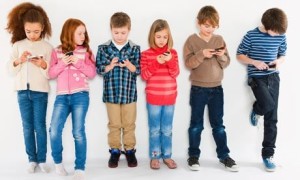Digital media has transformed the way we view the world, literally. The average adult spends about 60 hours a week staring at a screen including televisions, computers, and mobile phones (Krishna, 2015). From the way we shop to the way to talk, screen-based media has dominated our lives.
However, as great as playing Candy Crush is in avoiding boredom and people while you awkwardly wait for your 20 piece nuggets at McDonald’s, your screen may be doing you more harm than good. A recent study conducted by a group of researchers at UCLA found that using screen-based media and communication decreased people’s abilities to develop skills in reading nonverbal cues and understanding people’s emotions (Uhls et al., 2014).
In their experiment, Uhls el al. (2014) recruited a group 105 six graders from a public school in Southern California. The participants were pre-teens who reported that they spent approximately 4 ½ hours a day outside of school engaged in media usage including texting, watching TV, and playing video games. For their experiment, participants were divided into two groups. The first group spent five days in an overnight camp where they were not allowed to use any form of screen-based media and communication such as television, computers, and mobile phones. The second group were allowed their usual media practices. Through a series of pre and post tests, the group that was limited to in-person interactions for five days were found to be significantly better at reading facial emotions and recognizing nonverbal cues compared to the group that was allowed their usual media practices.
Although the digital world has enhanced our ability to communicate with people in terms of distance and time, the implications of the study show that it really could be hindering the quality of our communication in-person.
As society becomes more heavily reliant on digital media usage, have you seen a shift in how people engage with others in-person? Generation X and Y, grew up at the start of the digital world, do you see a differences in how effective they are in communicating with others in-person? I think this is especially interesting as millennials start to dominate the workforce as baby boomers continue to retire. If this is truly the case, it might be beneficial for parents and organizations to change their routines to reduce the use of screen-based media and communication when possible to develop and maintain the ability to read nonverbal cues.
It’s a reality that is hard to escape, you’re literally staring at a screen as you read this. So take a moment, find a person and have a conversation with them in-person, it’ll make you more sociable.
References
Krishna, G. (2014, February 22). Here’s how to stop looking at your phone every five seconds. [Blog post]. Retrieved from http://qz.com/345815/heres-how-to-stop-looking-at-your-phone-every- five-seconds/
Uhls, Y. T., Michikyan, M., Morris, J., Garcia, D., Small, G. W., Zgourou, Z., & Greenfield, P. M. (2014). Five days at outdoor education camp without screens improves preteen skills with nonverbal emotion cues. Computers in Human Behavior, 39, 387-392. doi:10.1016/j.chb.2014.05.036


3 Responses to Your screen is making you less social